PHOTO
Wednesday, Sep 07, 2016
Dubai: Even Abu Dhabi’s developers are turning their gaze to the mid-market. It will require a major readjustment on their part given the overwhelming emphasis on premium home buyers until now.
“Most of the focus in the past has been on luxury and high-end units,” said Sameh Muhtadi, CEO of Bloom Properties, the Abu Dhabi-based developer. This is the first time that people are more serious about providing middle-income housing, and it’s a huge sector — it’s about time.”
Developers have said in the past that mid-market units are not profitable enough. This year, however, valuations are becoming more attractive, meaning developers can buy land plots for cheaper prices.
“You cannot offer middle-income housing if the land is expensive, so you have to be smart in identifying plots that are very reasonably priced,” Muhtadi said. “With the conditions we have in this market, I think it’s the ideal time to find such opportunities.”
In May, Aldar Properties said it was planning to develop more mid-income housing, which “will be a recurring theme within our development pipeline”.
Talal Al Dhiyebi, Aldar’s Chief Development Officer, said 90 per cent of the 408 units on Meera, a mid-market project, were sold out in less than six months, and the developer is in the design phases of similar projects.
But until the change comes, Abu Dhabi’s property market is going through a tightening on the supply side.
“Supply is slowing down across the board in the UAE and in the region,” said Asma Dakkak, Research Manager for the Middle East and North Africa at JLL, the consultancy. “Materialisation is a big issue to account for.
“So, factors like Britain voting to leave the European Union, lower oil prices, political instability in the region could lead to a delay in some project delivery, which is being seen across the board.
“That is not to say supply is not happening… but the one thing to note is that the nature of supply is starting to change in Dubai and Abu Dhabi. We are seeing on the residential side that both governments are trying to promote a more affordable front for rents and sales.”
In Abu Dhabi’s residential space, rents declined in the second quarter of 2016 for the first time in three years and it is expected to see further declines through the second half of the year, according to JLL’s quarterly report.
In the second quarter this year, just 400 units were delivered, whereas nearly 4,000 units are expected to enter the market by the end of the year. Many of these will experience a delay in handovers, JLL said.
“Delaying projects is probable, but again, this is the case in the region and not just Abu Dhabi,” said Dakkak. “They [developers] will delay projects until there’s further clarity.
“Funding is another main component that plays into it; so right now, funding is low in the market, and all this feeds into projects which could ultimately be delayed.”
Another real estate firm, Asteco, also cited limited supply of new homes in its latest report, saying that transaction levels in Abu Dhabi have been largely quiet.
John Stevens, Managing Director of Asteco, said that many tenants have left high-end large units for more affordable developments, leading to a rise in vacancy rates for larger units. This trend could also prompt an increase in rentals for smaller units as demand for more affordable housing grows.
By Sarah Diaa Staff Reporter
Gulf News 2016. All rights reserved.





















